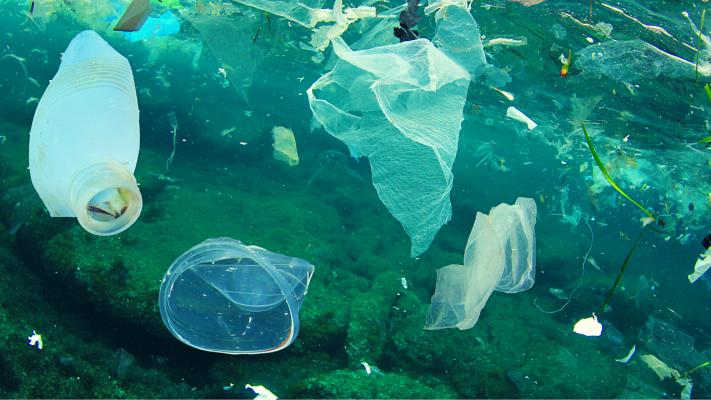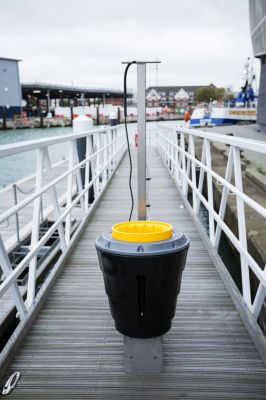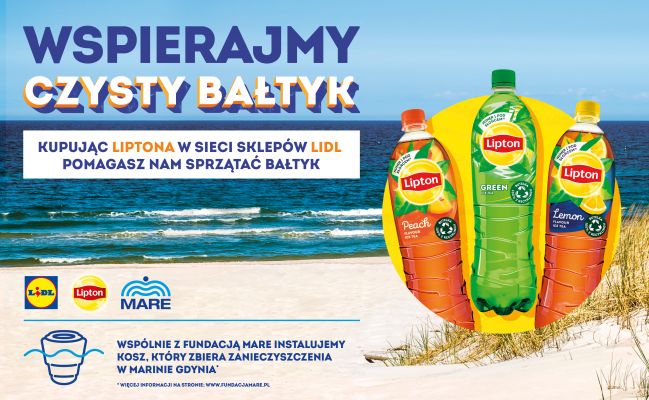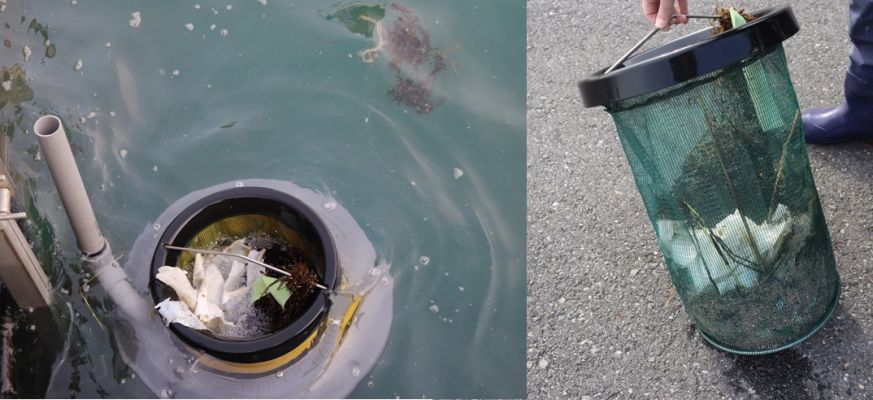Another SEABIN will collect litter in the Gdynia Marina
The Baltic catchment area is inhabited by approx. 85 million people, with 45% of Poles in the population. Moreover, 99.7% of the area of Poland is located in this catchment area. This means, that wherever we live, at the coast or in the south of Poland, we all have an impact on the Baltic Sea and we are all responsible for its condition. The MARE Foundation reminds: let it be only a positive impact, with as little as possible.
Thanks to the financial support of the Lipton Ice Tea company and the cooperation with the Gdynia Sports Centre, another sea bin was installed in the Gdynia Marina. This is the second SEABIN installed by the MARE Foundation and the fourth one in Poland.
THE PROBLEM
Plastic pollution of the seas and oceans is an extremely serious problem. Between 4.8 and 12.7 million tonnes of plastic still end up in the seas and oceans!! Marine litter that ends up in the Baltic mainly comes from households (48%) and recreational and tourist activities (33%). 56% of all litter on the Baltic beaches is composed of plastic waste.
Consumer behaviour is the main factor contributing to marine litter. The way we handle our waste and how much waste we generate has a huge impact on the environment. Plastic waste is the biggest problem and risk to marine organisms and ecosystems. Fish, birds and marine mammals entangle in the litter or get injured. plastic does not decompose, but only breaks down into smaller and smaller particles, the so-called microplastic (particles below 5 mm), which remain forever in the ecosystem. Due to their small size, microplastics are easily swallowed by living organisms and thus enter the food chain. Recently, microplastic particles have been found in drinking water and such food products as salt or honey. Their effects on human health are not yet known.
- This problem requires interdisciplinary cooperation between scientific institutions, non-governmental organisations, companies and the governmental institutions. Actions should be taken at different levels, at the same time, including education, reducing plastic use, proper waste segregation, recovery of raw materials, and retrieval of litter from the seas. We are very happy that many companies see the need to undertake actions and implement sustainable development strategies - says Olga Sarna, the Chair of the MARE Foundation.
- One of the available and fast solutions to the problem of plastic waste is SEABIN – a bin to collect waste directly from water. SEABINs help to effectively care for the seas. They reduce the amount of litter in the sea! – adds Olga Sarna.
One SEABIN is able to collect up to 20 kg of waste, not only plastic but also liquids such as oil. Water is sucked into the bin and goes through a filter. Then it is pumped out. The waste stays in the bin..
In one year, one SEABIN can remove up to 1.500 tonnes of litter:
- 90.000 plastic bags
- 35.000 disposable cups
- 16.500 plastic bottles
- 166.500 plastic straws
Annually, one SEABIN can collect up to 1.5 tonnes of litter per year! 860 SEABINs have been installed in 52 countries, including 3 in Poland: two in the Gdańsk Marina and one in Łeba. The SEABIN installed by Lipton Ice Tea, Lidl Polska and the MARE Foundation is the fourth bin installed in Poland and certainly not the last one.
REUSE - REDUCE - RECYCLE
Choosing a RECYCLED bottle brings benefits in the fight for clean seas and oceans. All Lipton Ice Tea bottles come from 100% recycled plastic, coming from PET bottles. And most importantly, these bottles can be recycled again! Thanks to this initiative, 2.300 tonnes less plastic is put into circulation per year.[1]
Going a step further in protecting the environment, Lipton Ice Tea in cooperation with the Lidl Polska chain helps to get a cleaner Baltic by supporting the installation of a SEABIN in the Gdańsk Marina. Our joint efforts will help to get a cleaner Baltic!
The PepsiCo strategy consists of building a world without plastic waste. We are aiming at circular economy, in which plastic bottles are produced from plastic bottles. This means that the recycling rates must be increased to recover the bottles from consumed soft drinks – says Julian Krzyżanowski from PepsiCo.
Therefore, in July 2020, we offered to our consumers Lipton Ice Tea in bottles recycled from 100% rPET. And wat the end of 2020 we announced that until the end of 2021 all bottles of Pepsi and Mirinda will be produced from 100% rPET. Similar commitments were taken in eight European countries. Reduction of greenhouse gas emissions by on average 40% as compared to PET bottles produced from primary raw material will be an additional effect of this measure - adds Krzyżanowski.
We are happy that our business partners, such as PepsiCo undertake actions to eliminate plastic. Thanks to the new initiative implemented in cooperation with the MARE Foundation the amount waste in the Baltic will be significantly reduced. Reduction of plastic use is very important for us. Lidl Polska is constantly implementing the goals of the REset Plastic strategy and undertakes measures aimed at reducing the use of plastic materials and supporting the circular economy. We hope to be able to eliminate a significant amount of plastic from the surrounding environment – says Aleksandra Robaszkiewicz, Head of Corporate Communications and CSR.
On the REset Plastic strategy of Lidl:
As part of the Schwarz Group, Lidl is one of the leading grocery retailers in Germany and Europe. Aware of its responsibilities towards the environment, the Group has elaborated a comprehensive REsetPlastic strategy covering five areas of activity: from reducing and designing, through recycling and removing the plastic to innovation and education. In this way, the vision of less plastic will become a reality.
Areas of activity under the REset Plastic strategy:
REduce: We reduce plastic wherever sustainably possible
REdesign: We design recyclable packaging and close loops
REcycle: We collect, sort, recycle and close loops
REmove: We support the removal of plastic waste from the environment
REsearch: We invest in research and development of innovative solutions and educate on recycling
More information at: https://reset-plastic.com/en/
The MARE Foundation
The MARE Foundation has been working for the benefit of the Baltic Sea for years. It is the only non-governmental organisation in Poland focusing on the protection of marine ecosystems, with particular emphasis on the protection of the Baltic. Its main activities include the marine litter (ghost nets, plastic) hazardous wrecks and education.
Protect the Baltic with us.
-------------------------------------------------------------------------------------------------------------------
[1] Internal assessment of PepsiCo
Source: Press release





